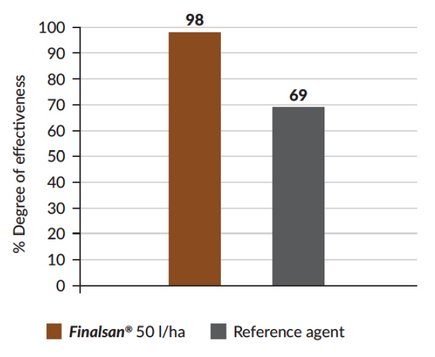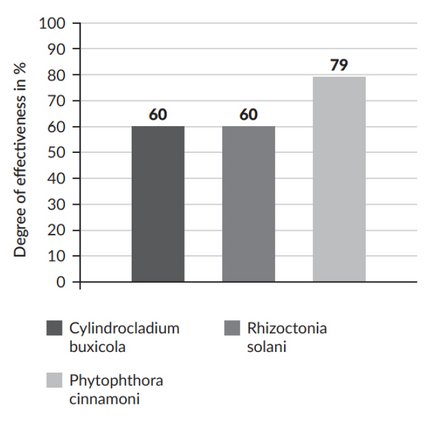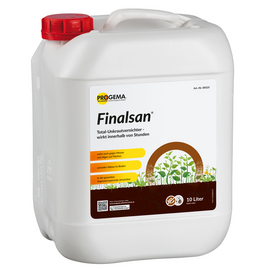Package sizes:
Active agent
186.7 g/l pelargonic acid
Information relating to the active agent
The active agent of Finalsan® is pelargonic acid. Pelargonie acid - also known as nonoic acid - belongs to the fatty acids. In nature it is found, for instance, in natural oils and in geraniums (Geraniaceae).
Manner of action
Finalsan® is a non-selective contact herbicide. The active agent of Finalsan® - pelargonic acid - penetrates the wax layer (cuticle) of the leaves. The lipophile part of the fatty acid then destroys the cell membranes of the plant's epidermic cells - the outer skin - there by inducing the rapid release of the substances contained in the cells so that the plant quickly dries up.
Action spectrum
Finalsan® is effective against all mono- and di-cotyledonous weeds such as dandelions, plantains, grasses, bindweeds, nettles and thistles. The leaves of the goutweed and the common field horse-tail are also rapidly killed by Finalsan® which can also be used to control moss and algea since many kinds of moss and algea can be effectively exterminated with Finalsan®.
Efficacy
The leaves of plants treated with Finalsan® turn brown within a few hours - an effect that is associated with both mono- and di-cotyledonous weeds.
Application
Thorough wetting of the weeds
Finalsan® is applied by spraying. Intensive weed spraying must be assured since only the directly wetted plant parts die. An optimal effect is assured when the weeds are 5 to 10 cm tall. The weeds should be dry when they are sprayed because, otherwise, the active agent will be diluted.
Temperatures during application
Finalsan® is effective within a wide temperature range. Since its effect is independent of the plant's metabolic processes Finalsan® can be applied in spring right up to late autumn. The minimum temperature during application is 10 °C. Apply preferably at temperatures below 25 °C.
Repeat treatment
With root-stock weeds it is advisable to repeat treatment after 4 to 6 weeks.
Areas of application approved by the German Authorities
| Harmful organism | Plant cultures/objects | Application rate | Application frequency |
|---|---|---|---|
| Mono- and di-cotyledenous weeds | Ornamental plants and ornamental shrubs on open ground | 166 L/ha or 16.7 %, i.e. mix 1 L Finalsan® with 5 L water. 1 L spraying solution sufficient for 10 m² weed area | Max. 4 applications spaced 21-40 days. (Spraying method: Individual plant treatment) |
| Mono-and di-cotyledenous weeds | Paths and squares* With shrubs on non-crop land | 166 L/ha or 16.7 %, i.e. mix 1 L Finalsan® with 5 L water. 1 L spraying solution sufficient for 10 m² weed area | Max. 8 applications spaced 21-40 days. (Spraying method: Individual plant treatment) |
| Algae and mosses | Ornamental plants and ornamental shrubs on open land | 166 L/ha or 16.7 %, i.e. mix 1 L Finalsan® with 5 L water. 1 L spraying solution sufficient for 10 m² weed area | Max. 4 applications spaced 21-40 days. (Spraying method: Individual plant treatment) |
| Algae and mosses | Paths and squares with ornamental shrubs on non-crop land | 166 L/ha or 16.7 %, i.e. mix 1 L Finalsan® with 5 L water. 1 L spraying solution sufficient for 10 m² weed area | Max. 1 application spaced 21-40 days. (Spraying method: Individual plant treatment) |
| Mosses | Ornamental and sports lawns | NOTE - Other application concentration: 166 L/ha or. 1.67 %ig, i.e. mix 100 ml Finalsan® with 5.9 L water. 1 L spraying solution sufficient for 1 m² moss area | Max. 1 application (Poured for partial area treatment) |
*Application of the agent on open areas that are not used for agricultural, forestry or horticultural purposes is only permissible with the approval of the responsible local authority (section 6.2 &6.3 of the Plant Protection Act).
Application on open stacking/ storage yards
Finalsan® has proved its worth for rapid and lasting control of mosses and algae on open stacking/storage yards. The pelargonic acid active agent ensures rapid and sustained destruction of the tissue of algae and mosses. Consequently it takes months for mosses and algae to recolonise such areas. Moreover, the danger of slipping on open stacking/storage yards is greatly diminished.
Furthermore, this prevents the multiplication of sciarid and marsh flies which like to lay their eggs underneath algae covers. The active agent is rapidly decomposed on the free areas so that pots and containers can once again be deposited on the areas soon after treatment.
Test results
Degree of effectiveness of Finalsan® against algae two months after spraying
Algae on open stacking/storage yards

Side effects against fungal pests
Studies conducted by the Agricultural Chamber of Lower Saxony indicate that the application of Finalsan® against mosses and algae on open stacking/storage yards with a filleted surface results in a distinct reduction of infestation by fungal pests. lt was established that the infection potential within tree and ornamental plant nurseries by important diseases such as Rhizoctonia solani, Phytophthora cinnamomi and Cylindro-cladium buxicola, can be significantly diminished.
Degree of efficacy against different diseases
Summary of 4 tests
Finalsan® 166 l/ha, 2000 l spraying liquid/ha
The tests revealed that high water application rates of 2000 litres achieve excellent tissue penetration, thereby intensifying the effect.

Plant compatibility
Finalsan® is a total herbicide that kills all contacted green plant parts. Consequently, do not allow the agent to come into contact with the leaves of crop plants. Woody plant parts are not damaged so that Finalsan® can be applied under trees and shrubs without causing any problems. The agent is not translocated via green or brown bark parts of trees or shrubs.
Material compatibility
Finalsan® is well tolerated by materials. In some cases white patches may appear when it is applied on dark materials, but these quickly disappear after rainfall. Avoid contact with synthetic resin plates and surfaces containing copper or zinc. Contact with these materials can result in a more persistent discolouration. With other sensitive materials check compatibility at a concealed point.
Miscibility
Finalsan® is miscible with herbicides containing glyphosate. The effectiveness of the two agents complement each other.
Data relating to environmental compatibility
Waters: No conditions regarding distance to waters. Possible national legal stipulations must be observed. Application in the immediate vicinity of inshore and coastal waters is impermissible. Harmful to aquatic organisms. Finalsan® in waters is broken down within a few days. 50 % of the agent is broken down already after 1 day.
Soil: Finalsan® is rapidly broken down in the soil. 50 % of the active agent is broken down already after 3 days.
Beneficial organisms: Not harmful to beneficial organisms.
Bees: Not harmful to bees (B4).
Classification according to GHS/CLP Ordinance
Eye lrrit. 2, H319
Please note
Use plant protection products safely. Always read the label and product information before use.
Distribution
Downloads
-
Finalsan_Finalsan_Plus.pdf (4 MB)
For further information please visit the download-center



